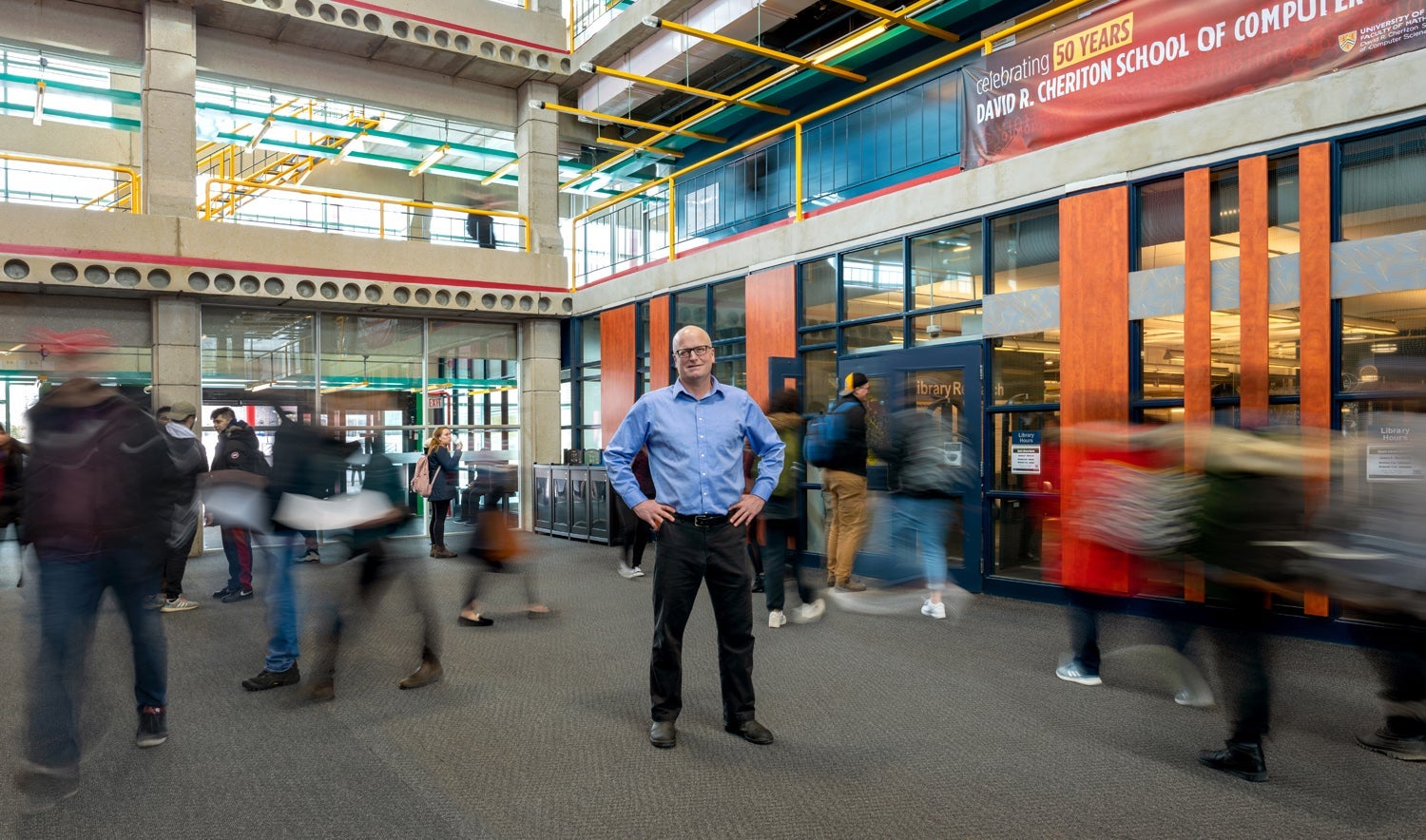Cheriton School of Computer Science Professor Jesse Hoey has had a curious career trajectory.
His academic life began with an undergraduate degree in physics, followed by a master’s in physical oceanography, then a PhD in computer science with specialization in artificial intelligence. He even had a stint working with occupational therapists as part of his postdoctoral studies, where he applied his expertise in AI to develop assistive technologies for people with dementia.
His first academic position was as an assistant professor in Scotland. He is a now an associate professor of computer science at Waterloo, where he leads the Computational Health Informatics Lab. He is also a member of the Pasupalak Artificial Intelligence Lab, the Centre for Bioengineering and Biotechnology, and the Waterloo AI Institute.

Cheriton School of Computer Science Professor Jesse Hoey, the new Associate Dean of Innovation and Entrepreneurship in the Faculty of Mathematics, wants to inspire others to apply social entrepreneurship — enterprising, innovative ideas — to solve our most pressing social and environmental problems.
Professor Hoey’s innovative research on developing emotionally intuitive AI to assist people with Alzheimer’s disease has been featured prominently at Waterloo and on CBC News. He has received prestigious grants and accolades from funding agencies and peers, including awards you might not expect of a computer scientist. In 2017, he received a $850,000 grant from the Trans-Atlantic Platform for the Social Sciences to explore the social and psychological mechanisms at play in self-organized collaborative projects.
He was a Cheriton Faculty Fellow from 2014 to 2017, a prestigious recognition given to support foundational and applied research across the School of Computer Science. And he was an inaugural Wes Graham Research Fellow from 2017 to 2019, a professorial fellowship established by the Wes Graham Trust to support top researchers in artificial intelligence, data science and bioinformatics. His many academic recognitions include the Outstanding Recent Contribution in Social Psychology Award from the American Sociological Association in 2017 and again in 2019 for his innovative research that bridges the chasm between the social sciences and computer science.
It is perhaps not surprising that in his new role as the Associate Dean of Innovation and Entrepreneurship in the Faculty of Mathematics, Professor Hoey hopes to inspire others to apply social entrepreneurship — enterprising, innovative ideas — to solve our most pressing social and environmental problems.
“Social entrepreneurship can be a driving force behind innovation and entrepreneurship in the Faculty of Mathematics, something professors and students would be keen to be part of,” Professor Hoey said. “Social entrepreneurship appeals to broad cross-section of researchers that are united by their deep care about social and environmental issues. They want their mathematical and scientific discoveries to make a difference. My vision for the position of Associate Dean of Innovation and Entrepreneurship is to help them apply their discoveries to bring about positive change.”
A large component of Professor Hoey’s research over the past four years has been studying online collaborative networks, exploring data-driven theoretical insights into what motivates self-organized collaborations and what determines their success.
“We’ve looked specifically at GitHub, an online community where people work together to build software, but there are lots of other communities out there — online networks where people collaborate to solve pressing and important societal and environmental problems.”
In any community of collaborators, we expect a range of personality types and work styles, he said. “A major challenge is getting a diverse group of people who are interacting online to work together more effectively, more efficiently, and more inclusively. All sorts of emotional factors are in play. Who’s being the dominant person, perhaps being too pushy or a bully, and who in the group has a great idea, but isn’t being listened to because of the person’s gender, race or personality.”
He also points to the growing presence of automated systems — such as bots — that are proliferating online. “Bots can have a huge impact, and the key is to figure out how they can help humans work towards a greater social benefit in contexts such as healthcare, politics and law.”
With his expertise and interest in social entrepreneurship and in assisting communities of collaborators, Professor Hoey hopes he can encourage and support others in the Faculty of Mathematics to apply social entrepreneurship principles to organize, create and manage ventures that bring about social change. Encouraging diversity and overcoming biases and stereotypes are key elements in Professor Hoey’s vision.
“Getting people to work together is extremely challenging. It involves psychology, sociology, legal processes, among other factors. I believe that we can model these mathematically and computationally, and the endeavour will bring together many people within the Faculty of Mathematics, from those in pure math, applied math and statistics to those in combinatorics, optimization and computer science.”